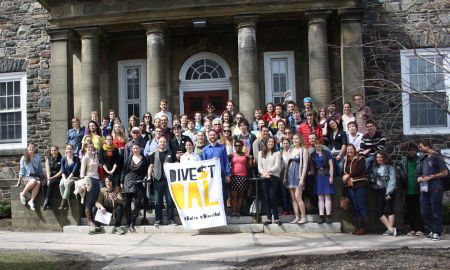K'JJIPUKTUK (HALIFAX)-- Conversation broke out and emotions flared during Dalhousie’s Board of Governors meeting Tuesday afternoon.
Divest Dalhousie showed up with just under 100 supporters, breaking the record for the third time in a row for student turnout at a Board of Governors’ meeting.
The group, which is made up of both students and alumni within the community, is trying to convince Dalhousie University to eliminate its stake in fossil fuel investments.
Dalhousie has an endowment fund–a pool of money used to support “enrichment activities”–which as of today is invested in some of the largest fossil fuel companies in the world.
Divest Dal has three goals in mind:
- Making information on Dalhousie’s investments accessible and transparent
- Freezing all future investments into fossil fuel industries
- Establishing a four-to-five year plan to completely divest the endowment fund from the fossil fuel industry.
Divest Dal met with the Board’s investment committee in February and presented reasons why divestment is a sound financial option and a good decision for sustainability.
Yesterday, the group was hoping to hear a formal response about whether Dalhousie is ready to divest. Instead, they were met with an administration that was guarding their answers and skirting their questions, says Stephen Thomas, an alumni and member of Divest Dal.
During the meeting President Florizone said that the Board needed more time to understand how divestment might impact the institution, and look at what other universities are doing.
“Let’s work on this, and let’s talk about it. You wouldn’t want me to move any quicker on tuition rates,” he said. “So I’m wanting the same amount of time.”
The group was visibly disappointed, but this didn’t stop members from standing up and speaking out.
Liv Bochenek was the first to stand up. She told president Florizone that Divest Dal is not being accurately represented by board members. This initiated a conversation between members of the board and divestment supporters.
Board members agreed that divestment and sustainability are very important to the university and its members, but they continued to encourage the supporters of divestment to give them more time to allow the investment committee to go over the idea more thoroughly.
Thomas is confident that Dalhousie’s investment committee will find divestment to be financially sound, but is concerned that they, “can only go so far.”
“The investment committee will check out the fact that divestment is financially sound and in fact in a not too long term it is a good investment. Period,” says Thomas. "Regardless of your stance on climate change, regardless of how impressive your climate change strategy wants to be, divestment is a sound financial decision. They will come to that conclusion regardless of what else is at play.”
Florizone also explained that millions of dollars would have to be moved, stating that this would take time.
The group then asked for a meeting with the executive committee (the president, committee chairs, and vice president) before the next Board of Governors meeting in June. But members of the board denied that option, saying that it would be too premature.
“This is [a] big issue and that is what they continue to skirt. They continue to skirt it into the investment committee box,” says Thomas.
With the summer fast approaching, the group realizes that things will begin to cool down, especially with only one Board of Governors' meeting in the foreseeable future.
“We are taking it as an opportunity to regroup and restrategize,” says Robin Tress, a Divest Dal member. “So that we can come out in full force in September.”




 https://fbexternal-a.akamaihd.net/safe_image.php?d=AQDmqkmgHoVqcGBy&w=11...
https://fbexternal-a.akamaihd.net/safe_image.php?d=AQDmqkmgHoVqcGBy&w=11...